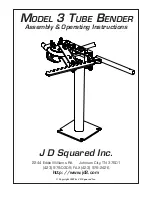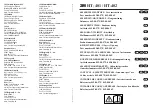
IMPORTANT OPERATIONAL CONSIDERATIONS
1)
The CD standard utilises a 44.1KHz sampling system, therefore use a 44.1KHz +/- 1000ppm external
clock source for correct operation. If, for example a clock frequency higher than 44.1K is used, the
playback speed and pitch will increase accordingly.
2)
Changing the clock source during play or record may cause the CDR850 PLUS to not operate correctly.
If this occurs, reset the power to the machine. Set the clock source using the dip-switch selector
when in ‘STOP’ mode or when the machine is powered down.
3)
The CDR850 PLUS is designed so that the default clock source is ‘INTERNAL’ For example, if the
machine is set to lock to the word clock input and there is no word clock signal connected, then the
machine will revert to ‘INTERNAL’. This ensures that if a clock source input becomes intermittent, the
850 PLUS will always revert to its internal clock.
4)
When recording from or monitoring the digital input, the CDR850 PLUS outputs the clock contained
within that digital input i.e. the monitor signal bypasses the SRC as with a standard CDR850. However,
a word of caution - If the SRC is on (e.g. 48KHz input or SRC manually turned on in MENU), then the
‘write’ data rate itself will utilise the clock programmed by the dip-switch selector. Ensure that this is
a 44.1KHz clock. The CDR850PLUS will flash ‘CHECK’ in the display if an out of spec. clock is used
during recording.
5)
When recording or monitoring the analogue input, the CDR850 PLUS locks to the clock source set by
the 4-way dip-switch as it does in playback mode. NOTE - it is not possible to record analogue inputs
when the 850 PLUS is locked to any clock other than 44.1K +/-1000ppm as this is outside the Orange
Book specification. The CDR850PLUS will flash ‘CHECK’ in the display if an out of spec. clock is used
during recording.
BALANCED DIGITAL OUTPUT
This output has all the electrical characteristics of the AES/EBU digital audio interface i.e. 110
Ω
, 5Vp-p,
balanced line and therefore can be connected to AES/EBU type inputs. The male XLR is wired pin1-
ground; pin 2-hot; pin 3-cold. The format of the data follows the SP/DIF protocol i.e. transmits sub-code
data such as start ‘ID’, CD ‘Q’ channel, SCMS etc.
SPECIFICATIONS
Balanced Digital Output:
Impedance
110
Ω
Amplitude
5Vp-p
Format
SP/DIF
Word Clock Input
Impedance
75
Ω
Amplitude
TTL levels
Operating Frequency
44.1KHz +/-1000ppm
AES/EBU, SP/DIF COAX/OPTICAL Clock Input
Operating Frequency
44.1KHz +/-1000ppm






















